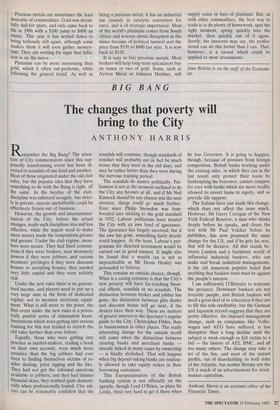BIG BANG
The changes that poverty will bring to the City
ANTHONY HARRIS
Remember the Big Bang? The atten- tion of City commentators since this sup- posedly transforming event has been di- verted to scandals of one kind and another. Most of these originated under the old club rules, but the popular idea that they have something to do with the Bang is right, all the same. In the heyday of the club, discipline was enforced savagely, but strict- ly in private; anyone unclubbable could be effectively frozen out of business.
However, the growth and international- isation of the City, before the actual changes, made such disciplines less and less effective, while the urgent need to make more money made the temptations greater and greater. Under the club regime, mem- bers were secure. They had fixed commis- sions if they were brokers, near monopoly Powers if they were jobbers, and various monitors' privileges if they were discount houses or accepting houses; they needed very little capital and they were reliably rich.
Under the new rules there is no guaran- teed income, and players need to put up a very large ante in the form of dedicated capital, not to mention electronic equip- ment. What is still more to the point, the first event under the new rules is a poten- tially painful series of elimination heats. Institutions which were getting into serious training for this test tended to stretch the old rules further than ever before.
Equally, those who were getting into practice as market-makers, trading a book on their own account, were much more sensitive than the big jobbers had ever been to finding themselves victims of in- sider dealing, price rigging and the like. They had not got the informal sanctions available to jobbers, and they had thinner financial skins; they writhed quite dramati- cally when professionally fouled. City edi- tors can be reasonably confident that the scandals will continue, though standards of conduct will probably not in fact be much worse that they were in the old days, and may be rather better than they were during the nervous training period.
The scandals do matter politically. Par- liament is not at the moment inclined to do the City any favours at all, and if Mr Neil Kinnock should by any chance win the next election, things could go much further. Ever since Philip Snowden was bam- boozled into sticking to the gold standard in 1932, Labour politicians have treated the City with an awe bred of ignorance. The ignorance has largely survived; but if the awe has gone, something fairly drastic could happen. At the least, Labour's pro- gramme for directed investment would be carried out in good earnest. It might also be found that a wealth tax is not as impracticable as Mr Denis Healey was persuaded to believe.
This remains an outside chance, though. What is a racing certainty is that the City's new poverty will have far-reaching finan- cial effects, scandals or no scandals. The distinction between broker and jobber has gone; the distinction between gilts dealer and discount house will go next, if the dealers have their way. These are matters of greater interest to the Spectator's regular guide to the City, Christopher Fildes, than to businessmen in other places. The really interesting change for the outside world will come when the distinction between clearing banks and merchant banks already linked in many cases by ownership — is finally abolished. That will happen when big deposit-taking banks are routine- ly allowed to take equity stakes in their borrowing customers.
This Europeanisation of the British banking system is not officially on the agenda, though Lord O'Brien, as plain Sir Leslie, tried very hard to get it there when he was Governor. It is going to happen, though, because of pressure from foreign competition. British banks working under the existing rules, in which they can in the last resort only protect their loans by bankrupting the borrower, cannot compete for ever with banks which are more readily allowed to covert loans to equity, and so provide life support.
The Italians have just made this change, which does not affect the issue much. However, Mr Gerry Corrigan of the New York Federal Reserve, a man who thinks deeply before he speaks, and clears the text with Mr Paul Volcker before he publishes, has now proposed the same change for the US, and if he gets his way, that will be decisive. All that stands be- tween London and a Germanic world of influential industrial bankers, who can make and break industrial managements, is the old American populist belief that anything that bankers want must be against the people's interest.
I am sufficiently O'Brienite to welcome the prospect. Dominant bankers are not loveable people, and British bankers will need a good deal of re-education if they are to fill this role creditably; but the German and Japanese record suggests that they are pretty effective. An imposed management change, such as companies like Volks- wagen and AEG have suffered, is less disruptive than a long decline until the subject is weak enough to fall victim to a bid — the history of AEI, BMC, and all too many others. The change may take a lot of the fun, and most of the instant profits, out of shareholding on both sides of the Atlantic; but neither Britain nor the US is much of an advertisement for stock- market capitalism.
Anthony Harris is an assistant editor of the Financial Times.


























































 Previous page
Previous page